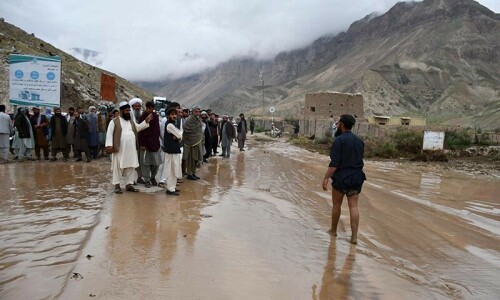RAPID geopolitical changes have been seen in the Middle East over the past few days with regard to the Syrian and Yemeni conflicts. The Bashar al-Assad government in Syria has begun to re-enter the Arab fold, after several years in the wilderness following the outbreak of the civil war. Meanwhile, in Yemen, there are indications that a more permanent ceasefire is possible, which would bring to an end the sufferings of that impoverished nation’s people, exacerbated by the power struggle between the Houthi rebels and the Yemeni government. It would not be wrong to suggest that developments in both the Syrian and Yemeni cases are linked to the thaw in relations between Iran and Saudi Arabia, following the decision of the two countries to bury the hatchet in a surprise announcement in Beijing last month. Riyadh and Tehran have considerable influence in the Syrian and Yemeni conflicts, and better relations between them could help stabilise these and other hotspots in the Middle East. The kingdom is also said to be mending fences with the Palestinian political and resistance group Hamas, which is close to Tehran.
Syria and Yemen have suffered for years, thanks to external machinations and bloody internal feuds. In 2011, during the height of the Arab Spring, the West and Arab states hijacked the anti-Assad popular movement, which exacerbated the civil war and opened the gates for extremist militants to join the fight against the Syrian president. Thanks to Iranian and Russian military intervention, the Damascus regime was able to survive, and now, the overtures to Syria from its Arab brethren are a sign that the regime change strategy has failed. The Syrian foreign minister was well-received in Jeddah last week, and the rehabilitation of Damascus within the Arab bloc seems only a matter of time. As for Yemen, there the pro-Iran Houthis dislodged the Saudi-allied government, leading to Riyadh’s intervention in 2015. Despite Western logistical support, the Saudis have been unable to defeat the Houthis, and the desire to wind down a costly, bloody war must have convinced Saudi decision-makers to give peace a chance. This explains the recent exchange of nearly 900 prisoners between the Houthis and the Yemeni administration. It is hoped these developments help bring durable peace to Syria and Yemen, and that the people of these shattered states can start rebuilding their lives.
Published in Dawn, April 18th, 2023












































Dear visitor, the comments section is undergoing an overhaul and will return soon.